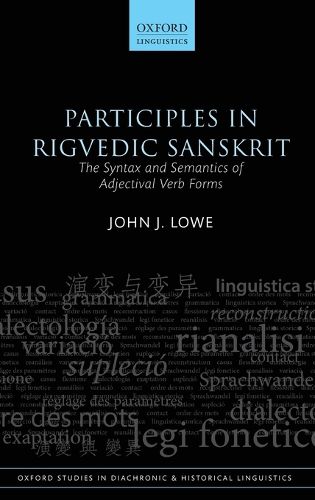Participles in Rigvedic Sanskrit: The Syntax and Semantics of Adjectival Verb Forms
John J. Lowe (Leverhulme Early Career Research Fellow, Leverhulme Early Career Research Fellow, Faculty of Linguistics, Philology, and Phonetics, University of Oxford)

Participles in Rigvedic Sanskrit: The Syntax and Semantics of Adjectival Verb Forms
John J. Lowe (Leverhulme Early Career Research Fellow, Leverhulme Early Career Research Fellow, Faculty of Linguistics, Philology, and Phonetics, University of Oxford)
This book examines several thousand examples of tense-aspect stem participles in the Rigveda, and the passages in which they appear, in terms of both their syntax and semantics. The Rigveda is an ancient collection of sacred Indian hymns, written in Vedic Sanskrit, and is one of the oldest extant texts in any Indo-European language. It is also a poetic text in which deliberate obscurity is the governing aesthetic and in which the rules of language are pushed to their limits in order to produce the ideal poetic expression. Many Vedic sentences are of controversial, disputed meaning, and Vedic scholarship is thus fraught with controversy. John J. Lowe applies formal linguistic analysis to the data and produces a comprehensive formal model of how participles are used. The author uses his findings to recategorize the data, by defining certain stems and stem-types as outside the synchronic category of participle on the basis of their syntactic and semantic properties. He suggests alternative sources for these forms and considers the linguistic processes that transformed old participles into non-participial entities. In his conclusion he reassesses the category of participles within the verbal and nominal systems, looks at their prehistory in Proto-Indo-European, and describes their universal, typological characteristics. Among his conclusions are that tense-aspect-stem participles have the technical properties of adjectival verbs, not verbal adjectives, and that such participles are not fully dependent on corresponding finite verbal forms. That is, a perfect participle, for example, need not share all the semantic and functional features of the finite perfect forms built to the same stem. These and many other conclusions drawn either directly challenge or radically revise received opinion and recent work.
This item is not currently in-stock. It can be ordered online and is expected to ship in approx 4 weeks
Our stock data is updated periodically, and availability may change throughout the day for in-demand items. Please call the relevant shop for the most current stock information. Prices are subject to change without notice.
Sign in or become a Readings Member to add this title to a wishlist.


